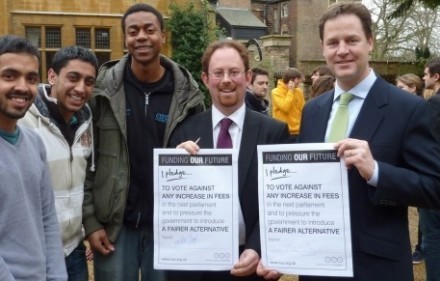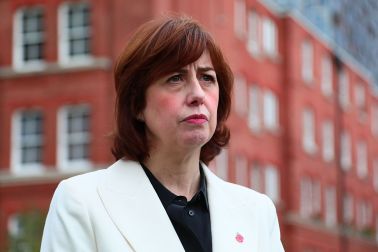Here are letters T to Z in our A-Z guide the coalition’s first year. A-F are here. G-M are here. And N-S are here.
T is for Tuition fees

“Broken promises, there have been too many in the last few years.” So said Nick Clegg in a Liberal Democrat video during the last election campaign. It was favourite theme of his — and one that he deployed both during the TV debates and in signing a pledge to scrap tuition fees. This was to be a New Politics. Clegg was to be its champion.
Shame it didn’t quite work like that. The coalition agreement was damaging enough to Clegg’s aura: it didn’t guarantee that tuition fees wouldn’t rise, only that the Lib Dems wouldn’t have to vote for such a rise. But then came the Browne review, and the final contradiction to Clegg’s pledge: tuition fees would rise after all. The Deputy Prime Minister had gone from being the face of honest politics to its betrayer. He had become a hate figure for the very people who had previously trilled, “I agree with Nick!”
Such are the concessions and compromises of coalition politics, you might say — and you’d be right. But there’s no arguing that Clegg had, for many voters, lost his credibility. It’s a blow from which he and the Lib Dems are still reeling, and may never fully recover.
U is for Unions
The brothers are tearing up British politics once again. After a decade of confused murmuring, they finally had an enemy to get stuck into: a Conservative-dominated government that had mind to cut
and to reform. What’s more, they now have their Own Man in charge of the Labour party. Labour MPs and members may not have voted for Ed Miliband — but the unions did, in droves.
For the most part, the government has met the union’s belligerence head on. The Tories, in particular, have relished tarring MiliE by association with Bob Crow, Len McCluskey and their kin. In a joint article with Boris Johnson for the Sun, David Cameron swaggered, “you can try to drag this country back to the 1970s, to a time when militants held our country to ransom, but you will not succeed.”
But the new era of union militancy has created problems for the coalition — only not really from the unions themselves. Since uniting with Cameron in anger for that Sun article, Boris has grown jaded at the progress made on anti-strike legislation. Only last week, he complained that the government was being “lily-livered,” and that it ought to “get a move on.” Forget left versus right — the sorest divides are those on same side.
V is for Vince
“Vince is Vince,” goes the refrain when the Business Secretary starts acting up. And it is a refrain that has been sung with increasing regularity since the birth of the coalition. At the start, Vince actually didn’t seem that much like Vince: he may never have displayed the same affection for his coalition partners as Nick Clegg did, but he was a staunch enough defender of the coalition itself, and particularly of its economic policies. But then the drip-drip provocations began. “Capitalism,” he frothed in his speech to the Lib Dem party conference, “kills competition where it can” — a sure inflammatory for Conservative hearts. And soon after came those injudicious remarks to a microphone-wielding Telegraph journalist. They gave 2010 one of its most memorable political quotations: “I have a nuclear option, it’s like fighting a war.”
Now Vince is certainly being Vince — and then some. His attack on the Tories last week, when he described them as “ruthless, calculating and thoroughly tribal,” was perhaps his most vicious intervention so far, and one that went well beyond the bounds of acceptable intra-coalition divide. He is once again a useful political barometer: someone worth watching to check the temperature of the coalition.
W is for War
For a while, it seemed as though David Cameron couldn’t be doing with war. His instinct on Afghanistan was simply to extract our troops, and he set a 2015 deadline for doing so. Then the Strategic Defence and Security Review suggested that his instinct was to withdraw from military action altogether: scrapping harriers, decommissioning HMS Ark Royal, and shedding 17,000 service personnel. The implications of that messy document are still unravelling, months on.
But then came Libya, and Cameron’s moment along with it. Along with Nicolas Sarkozy, the Prime Minister took a lead role in corralling international support for a no-fly zone, and deserves much credit for it. But by tying himself so closely to the campaign from the onset, Cameron is now bound to its outcome — be it success, failure, or something in between.
X is for X-rated language
Not very statesmanlike to call a journalist a “f****r” — but that didn’t stop David Cameron. The Prime Minister hurled the insult at the Telegraph’s James Kirkup, on a recent return flight from Pakistan, after Kirkup had the temerity — the sheer temerity — to report Cameron’s suggestion that Britain is responsible for many of the world’s problems. No, not very statesmanlike at all.
Oh, yes, and there was also this:
Y is for Yew-turns
Forgive the pun above, but the coalition’s U-turn over its forestry plans was a particularly striking moment. It fitted the pattern of previous U-turns over school sports and free milk — a hasty announcement, followed by celebrity-marshalled outcry, followed by capitulation — but was even more dramatic. And it will have emboldened the coalition’s opponents. If Annie Lennox and Rowan Williams can force so sweeping a reversal, then what can Ed Balls and the unions achieve?
Z is for Zzzzzz






Comments